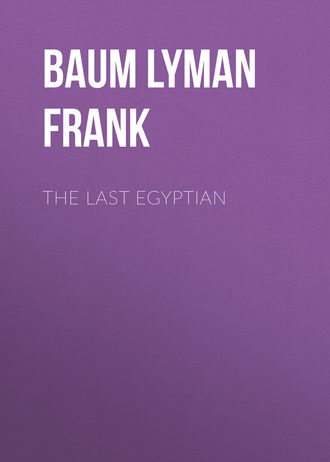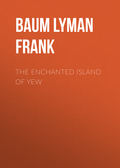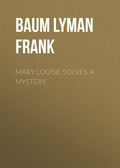
Лаймен Фрэнк Баум
The Last Egyptian
CHAPTER XXI
LOTUS-EATERS AND CROCODILES
If in all the realm of travel there is a voyage that is absolutely ideal, it is the trip up the Nile. The constant change of scene, varying with every bend in the river; the shifting lights, the gentle ripple of the waters, the distant songs and shouts of the native boatmen; the outlines of the Libyan hills by moonlight and the rocky wastes of desert, dotted with gorgeous crimson and yellow cacti, by day; the sunsets that paint the cloudless Egyptian skies with entrancing splendor, and the silhouettes of donkey and camel trains above the high embankment at twilight; these, taken in connection with the care-free, lotus-eating existence of the voyager, leave an impression so vivid and sweet and altogether satisfactory that no other experience in the whole world of travel can compare with or ever efface it from one’s memory.
Aneth believed the dragoman’s assertion that Prince Kāra had been generous at last and released her from her promise. Neither Winston nor Mrs. Everingham dared vouch for the dragoman’s statements; but they remained silent while Tadros, unabashed, explained that his master was whimsical and erratic, but very kind-hearted and considerate, and incapable of wronging any one in any way.
“As for Lord Roane, miss,” he said, confidentially, “there is no doubt he did an imprudent thing, which vexed my master, who has a high sense of honor; so he frightened my lord, to teach him to be more careful in the future. But never had he the slightest idea of exposing him to public infamy, I assure you. Kāra has told me so himself.”
The dragoman derived much satisfaction from these inventions, especially as he noticed how implicitly Aneth believed them, and how they operated to cheer her spirits and render her content with her novel and delightful surroundings. Everyone on board was devoted to the girl, and, under the genial influences of the voyage, she recovered, to an extent, her old brightness and vivacity. There was no harm now in blushing happily at the love-light in Gerald’s eyes, and her three companions were those she loved best in all the world. Her recent cares and heartaches seemed all to have been left behind in Cairo, and she could look forward to many weeks of keen enjoyment.
She was sorry, however, that she had misjudged Prince Kāra, and promised herself to implore his pardon immediately on her return to Cairo.
Gerald and Mrs. Everingham, while they did not disabuse Aneth’s mind, were a trifle uneasy at the growing audacity of the dragoman’s statements, and warned him to be more careful. After the girl had regained her health and self-possession, they would explain to her the truth of the matter and discredit Tadros freely; at present they were content to note her bright eyes and the roses creeping back to her cheeks.
Lord Roane had wisely decided not to ask questions. From what he overheard he understood that Kāra was now befriending Aneth instead of persecuting her, and this being the case, his own danger was reduced to a minimum. He could not understand the Egyptian’s change of attitude in the least. If Kāra had intended merely to frighten him, he had succeeded admirably, and Roane told himself that the punishment he had already suffered through terror and despair was sufficient to expiate his long-forgotten sin against Hatatcha. But did Kāra think so? That was a question he could not answer, but he decided to defer all worries for the present at least.
Gerald Winston would have been less than human had he refrained from showing to Aneth, during these delightful days, how dearly he loved her and what happiness her companionship brought to him. The moonlit evenings on deck were sufficient to inspire the most bashful lover, and Gerald did not dare waste his golden opportunities. If he won Aneth at all, it must be on this trip, and under the spur of Mrs. Everingham’s counsel to be bold, he soon put his fate to the test and marveled at his success. The girl had suffered too much to trifle with her lover’s heart, and her consent was readily won. It was his intention that they be married while at Luxor or Aswan, there being English churches in both places and ample conveniences for a proper conduct of the ceremony. Roane was fond of Winston, and offered no objection to a plan which would ensure Aneth’s happiness and which seemed to be defective only in its precipitancy.
The project pleased Aneth as much as it delighted her lover. In her days of misery, when she thought she had lost him forever, the full value of Gerald’s love had been so impressed upon her that she clung to him now, realizing that he represented the full measure of her future happiness; still, she experienced an uneasy sensation that any unnecessary delay might prove dangerous. Her contract with Kāra, moreover, had taught her to face the possibility of a sudden marriage, and what was a hateful ordeal then would now become a crown of triumph.
“Whenever you like, Gerald,” she said, “I will become your wife. I could never wish for other witnesses of my wedding than my dear grandfather and Mrs. Everingham; and happiness is such a precious thing and life so uncertain, that I have no desire to resist your proposal.”
“Thank you, my dear one,” he said, gravely.
“And I think I prefer Luxor to Aswan. It will be so romantic to be wed in the old Theban city, where the Egyptian princesses once made their home and where they lived and loved, will it not?”
“It shall be Luxor,” he declared.
That week was one of never-to-be-forgotten delight. Even Tadros wore a perpetual smile, although this method of sweet communion between lovers was all new and amazing to him. He felt quite secure now for the first time since Kāra had asserted his power over the dragoman’s destinies, and wondered – the thing being so easy – why he had so long hesitated to break with his arrogant and imperious master. As the dahabeah lazily breasted the languid current of the river, Tadros idly wondered what Kāra was doing now, and could not forbear a laugh at the thought of the Egyptian’s anger and perplexity when he had discovered the flight of his proposed victims. Oh, well – Kāra had pitted his cunning against the dragoman’s intelligence! It was little wonder he was discomfited.
On the afternoon of the seventh day they steamed slowly past Beni-Hassan, their moderate progress being due to the fact that the boat tied up from every sunset to the next sunrise. Beni-Hassan was a picturesque village as viewed from the river, where its filth and stench were imperceptible, and the groups of splendid palms lent a dignity to the place that a closer inspection would prove undeserved.
Aneth, seated happily by Gerald’s side beneath the ample deck awning, admired the village greatly, and her lover promised to stop there on their return and give her an opportunity of visiting the famous tombs in the nearby hillside.
At twilight they anchored midway between Beni-Hassan and Antinoe, the boat lying motionless a few yards away from the east bank.
The evenings are delightful in this part of Egypt, and it was midnight before the passengers aboard the dahabeah sought their couches. Tadros, indeed, being wakeful, lay extended upon the stern deck of the steamer long after the others were asleep, engaged in thoughtfully gazing at the high bank and indulging in pleasant dreams of future prosperity when he had added Winston Bey’s three thousand pounds to the snug savings he had already accumulated.
Presently a dark object appeared for an instant at the top of the bank and quickly vanished against the black surface below. Another succeeded it, and another.
Tadros scratched his head in perplexity. These dark objects seemed to have form, yet they were silent as the dead. He counted a dozen of them altogether, and while still pondering upon their appearance, being undecided as to whether they were ghosts or jackals, his quick ears caught a splash in the water beside the bank.
They were not jackals – that was certain; for those ravenous beasts never take to the water. Neither are ghosts supposed to bathe. From where he lay, the surface of the river was scarcely a foot distant, and, leaning well over the stern, Tadros managed to discover in the dim light several heads bobbing upon the water.
He ought to have given an immediate alarm, but terror rendered him irresolute, and before he had time to act, it was too late to arouse his fellow-passengers.
Clambering up the bow were half a score of naked Arabs, their knives held between their glistening teeth, their dark eyes roaming fiercely around.
Tadros’ first impulse was to fight; but just as he was about to rise to his feet a man whom he knew bounded aft and sprang into the little cabin where the women lay asleep.
It was Kāra.
There was no indecision on the part of the dragoman after that. He slipped off the deck into the water with the dexterity of a seal sliding from a rock, and while a succession of terrified screams and angry shouts bombarded his ears, Tadros swam silently across the Nile toward the opposite shore.
The water was cold, and he shivered as he swam; yet the chill was from within rather than from without. There are no crocodiles in the Nile now; but in places there are serpents and sharklike fish that will bite a mouthful of flesh from a swimmer’s leg. Tadros knew of this, but did not think of it just then. Reflected in his mind was Kāra’s dark visage, grim and malignant, and with certain death facing him aboard the dahabeah, the dragoman’s only impulse was to get as far away from the danger as possible.
The turmoil on the boat prevented his escape from being immediately noticed, and after a long swim, that nearly exhausted his strength, he reached the west shore and fell panting upon the hard earth.
Slowly regaining his breath, he strained his ears to catch any sound that might proceed from the dahabeah; but now an oppressive silence reigned on the opposite side of the river. The lights of the steamer gleamed faintly through the night, but the fate of those he had left on board was wrapped in mystery. Perhaps Kāra and his band of assassins would murder all except the girl; it was possible he would murder her as well. Anyway, the dragoman’s connection with the enterprise had come to an abrupt ending.
A mile or so away was the little town of Roda, with its railway station. Tadros started to walk toward it, keeping well back from the edge of the bank so that he might not be discovered in case anyone pursued him.
His dejection and dismay at this sudden reversal of fortune were extreme. He had lost the last vestige of the jaunty bearing that usually distinguished him. With three thousand pounds already earned but irretrievably lost, and the knowledge that Kāra’s merciless enmity would pursue him through life, the dragoman’s condition was indeed deplorable.
He wondered what he should do now. Returning to Cairo was out of the question. He would go back to Fedah, his old home. Nephthys and her mother were there, and would hide him if Kāra appeared unexpectedly. Yes, Fedah was his only haven – at least until he had time to consider his future plans.
By and by he reached the station at Roda – the village named after the ancient island in the Nile opposite Cairo. A sleepy Arab porter was in charge of the place and eyed the dragoman’s wet clothing with evident suspicion. When questioned, he announced that a train would go south at six o’clock in the morning.
Tadros slipped outside the station and found a convenient hiding-place against a neighboring house, where the shadows were so deep that he could not be observed. Here he laid down to rest and await the arrival of the train.
By daybreak his clothing had dried, but he observed with regret that his blue satin vest had been ruined by the river water and that his Syrian sash was disgracefully wrinkled. Next to life itself, he loved his splendid costumes, so that this dreary discovery did not tend to raise his dampened spirits.
When the train drew in he boarded it and found himself seated in a compartment opposite to Lord Consinor. They stared at each other for a moment, and then the viscount emitted a sound that seemed a queer combination of a growl and a laugh.
“It is Kāra’s alter ego,” he sneered, in English.
“Pardon me, my lord,” said the dragoman, hastily, “the alliance is dissolved. I have even more reason than you to hate the prince.”
“Indeed?” returned Consinor.
“He is a fiend emanating directly from your English hell,” declared Tadros, earnestly. “I know of no other diabolical place where Kāra could have been bred. One thing is certain, however,” he continued, with bitter emphasis, “I will have vengeance upon him before I die!”
There was no mistaking the venom of the man’s rancorous assertion. Consinor smiled, and said:
“It would give me pleasure to share your revenge.”
A sudden thought struck Tadros – a thought so tremendous in its scope and significance that he was himself astonished and stared blankly into the other’s face. For a time he rode in silence, revolving the idea in his mind and examining its phases with extreme care. Then he inquired, cautiously:
“Where are you going, my lord?”
“To Assyut.”
“I thought you had left Cairo long ago.”
“So I did. I have been to Alexandria, but found nothing there to amuse me. I am now bound for Assyut, and from there I intend traveling to Aswan, and up to Wady Halfa.”
“Are you in any hurry to reach there?”
“Not the slightest.”
“Then leave the train with me at Kusiyeh. I have something to propose that will interest you.”
Consinor studied him a moment.
“Does this program include our revenge?” he asked.
“Yes.”
“Very well; I will do as you suggest.”
“Good!” exclaimed Tadros. Then he leaned over and whispered: “Revenge and a fortune, my lord! Is it not worth while?”
CHAPTER XXII
THE DRAGOMAN’S INSPIRATION
They left the train at the station opposite Fedah, and the dragoman secured a native to row them in his skiff across the river. Consinor asked no questions and appeared wholly indifferent as to their destination. Indeed, his life had been so aimless since his disgraceful flight from Cairo that he welcomed any diversion that might relieve its dull monotony.
When they arrived at Fedah, Tadros took him secretly to the hut of old Nefert, the bread-baker, which was directly across the street from the dwelling of Hatatcha, now owned by Kāra. The viscount was inclined to resent the filthiness of the hovel wherein he must hide, until the dragoman led him to the shade of the opposite archway and explained to him something of the project he had in mind.
Tadros began by relating the “royal one’s” early history, emphasizing the fact that old Hatatcha had been able to support herself and Kāra without any labor whatever. Then he told of Hatatcha’s death, and how he, Tadros, had discovered the valuable rolls of papyrus in Kāra’s possession. From thence to the brilliant advent of the “prince” in Cairo was but a step, and the entire history permitted but one explanation – the fact that Kāra had knowledge of an ancient tomb containing great riches.
“Once,” said the dragoman, “Kāra and I made a visit to Fedah; but I did not suspect his errand and so neglected to watch him, being at the time greatly occupied with a certain maiden. In the morning I found he had loaded his traveling cases with treasures – wonderful gems that have enabled him to live in princely fashion ever since.”
“Where did he get them?” asked Consinor, eagerly.
“As I said, from some hidden tomb, the secret of which is known only to himself.”
“Do you think he has carried all of the treasure away?”
“I have reason to believe that more remains than has ever been taken. Once, in an unguarded moment, Kāra told me that he could not spend it all in a thousand years.”
“Do you suppose we can discover this tomb?”
“Yes, if we are clever. It is no use to hunt without a clew, but Kāra will furnish us the clew we need.”
“In what way?” the viscount inquired.
“He is coming here presently.”
Consinor frowned.
“I do not care to meet him,” he said, hastily.
“Nor do I,” rejoined Tadros, with a shudder; “but it will not be necessary for us to meet Kāra, who will not suspect we are in the village.”
“What then?”
“He is coming to secure more treasure, his former supply being exhausted, as I have reason to know. He has promised his tradesmen money, and will not dare delay his visit to Fedah. Besides, he is not far from here at this very moment. By to-morrow, if he comes in Winston Bey’s dahabeah, he will reach this place. If he decides to take a railway train, he may be here this evening.”
“In that case, what do you propose to do?” demanded Consinor.
“Spy upon him; discover where the treasure is hidden, and when he is gone, help ourselves,” was the confident reply.
The idea seemed quite feasible when further elaborated. They entered the room of Kāra’s dwelling and examined the place carefully.
“This,” explained the dragoman, “is doubtless his starting-point. From here he has either a secret passage into the mountain, or he steals away to the desert, where the entrance to the tomb is hidden underneath the shifting sands. We must be prepared to watch him in either event, and that is why I have proposed to you to assist me, rather than try to secure all the fortune myself. I am assured there is plenty for two, and to spare.”
“Doubtless,” replied the viscount, laconically. Already he saw visions of great wealth, which would enable him to return to London and rise superior to all the sneers and scandals that had been thrust upon him.
They discussed the matter long and earnestly, the few inhabitants of the village, stupid and inert, being entirely ignorant of their presence. It was finally decided that on Kāra’s approach Consinor should conceal himself beneath the dried rushes of the old bed, Tadros so arranging his position that the viscount could observe every action of one moving within the room. Then the dragoman would himself lurk at the edge of the village to follow Kāra if he stole away into the desert.
As a matter of fact, Tadros was firm in his belief that the treasure was hidden within the mountain; but he had no intention of risking his own life when he could induce Consinor to become his catspaw. Discovery meant death – he knew that well enough. It was better not to take chances, and if the viscount succeeded in learning Kāra’s secret it would mean the same to Tadros as learning it himself. He knew how to handle this outcast Englishman, and if the treasure proved as large as he suspected, he could afford to be generous, and would play fair with his accomplice. Otherwise – but that could be considered later.
Tadros did not desire to expose the stranger to the curious gaze of the villagers, but there was no harm in their knowing that the dragoman had come among his old friends once more; so he insisted that Consinor should stay concealed in Nefert’s hovel, flying to a dark corner at the sound of every footstep, while he himself visited Sĕra and her daughter in furtherance of his sagacious plans.
CHAPTER XXIII
MOTHER AND DAUGHTER
As the dragoman approached Sĕra’s hut he paused upon the threshold to observe the scene within, hesitating, as he remembered that it was because of his own reckless conduct that the Nile girl had been stripped of her beautiful gowns and jewels and sent home from Cairo scorned and repudiated.
Her humiliation and despair had haunted him ever since.
But now he found her seated meekly at the well-worn loom, casting the shuttle back and forth with the same mechanical lassitude she had exhibited of old. The discolored black dress, open at the breast and much patched and torn, was her sole garment. Even the blue beads were again about her neck.
But the eyes she turned toward Tadros were different, somehow. Their former velvety depths were veiled with a dull film, while the smoothness of her brow was marred by the wrinkles of a sullen frown.
After a moment, however, she seemed to recognize the dragoman, and rose from her place with a sudden eager look and flushed cheeks.
“You have come for me again?” she asked.
“No,” answered Tadros, casting himself upon a settle. He felt abashed without knowing why he should entertain such a feeling – abashed and sorrowful, in spite of his habitual egotism and selfish disregard of others.
Nephthys leaned back and resumed her weaving. The film covered her eyes again. She paid no further attention to her mother’s guest.
Sĕra, however, was voluble and indignant.
“That Kāra,” she hissed, “is a viper – a crocodile – a low, infamous deceiver! He is worse than an Arab. Henf! If I had him here I would stamp him into the dust. Why did he spurn my beautiful daughter from his harem? Tell me, then!”
“Merely because Nephthys and I, being old friends, wished to converse at times of you and our acquaintances at Fedah. Why should we not gossip and smoke a cigarette together? Once I owned her myself.”
“True. You were a fool to sell her.”
“Still, you must not forget that Nephthys has had an experience,” he resumed, more lightly. “For a time she was a queen, splendid and magnificent beyond compare in her robes of satin and her sparkling jewels. Ah, it is not every girl who enjoys such luxury, even for a brief season! Let her be content.”
“Content!” screamed old Sĕra, shrilly; “it has ruined her. She is no longer happy in the old home, and when she speaks, which is but seldom, it is only to curse Kāra. Look at her! Is she now fat and beautiful as before? No. If the poor child lives long enough, she will die a skeleton!”
“Allah forbid!” exclaimed Tadros, hastily. “But if she expects to be taken back again, her case is hopeless. I am sure Kāra will never relent or restore her to favor. He is a poor judge of a woman. But I,” slapping his chest proudly, “I will take Nephthys to myself; and while I do not promise to robe her as gorgeously as did Kāra, she shall become fat again, and have her silks and ornaments the same as before.”
“And the cigarettes?”
“Of course.”
He drew a box of the coveted cigarettes from his pocket and tossed it toward her. Sĕra lighted one eagerly and gave the box to Nephthys. After staring at it blankly for a moment the girl seemed to understand. She took a cigarette and lighted it from the one her mother was smoking. A smile of childish enjoyment slowly spread over her face, and she left her loom and came and sat upon Tadros’ knee.
“I expect Kāra in Fedah presently,” remarked the dragoman. “But he must not know that I am here. We have had a falling-out. I quarreled with him, and he threatens me.”
“Never fear,” said Sĕra, calmly. “I can hide you in the cavity in the rear wall, which the royal one knows nothing of. There you will be safe until he goes away.”
“Very good!” he replied.
“When will Kāra come?” asked the woman, “and why does he visit Fedah again?”
“I expect him to-night or to-morrow. Why he comes I do not know.”
“Perhaps to pray beside Hatatcha’s mummy.”
“Where is that?” he asked, quickly.
“I cannot discover,” she returned. “Often I have examined their dwelling, but no secret door can I find anywhere. The tomb must be in the hills – or perhaps in the desert. There is an oasis where the dwarf Sebbet lives. He was known to be one of Hatatcha’s most devoted followers.”
“True,” said the dragoman, thoughtfully.
“The tomb must be in Sebbet’s oasis. Once Kāra stole old Nikko’s donkey and rode there.”
“Was that the last time we came here?” questioned Tadros.
“No; it was when Hatatcha died.”
“Then the tomb is not in the oasis. I am sure it is quite near Fedah. But listen, my Sĕra; if I agree to take Nephthys and provide for her, you must help me when Kāra comes.”
“I have promised to hide you in the old wall,” she replied. “Can I do more than that?”
“Yes. You must go at once to the hill and watch for the royal one’s coming. Your eyes are sharp, even though you are old. He will come from the Nile – either across the river or from the north, on a boat that smokes and has no sails. As soon as you discover him you will hurry here to me, and that will give us time to prepare for Kāra. Will you do this for me?”
“May I have the box of cigarettes to take with me?”
“Yes.”
“Then I will do your bidding.”
She went away to the hill at once, leaving Tadros with Nephthys; but the girl had already forgotten his presence and was staring straight before her with lusterless eyes.
The dragoman sighed.
“It is very unfortunate,” he murmured, examining her critically, “but it is doubtless true, nevertheless – she is getting thin.”







